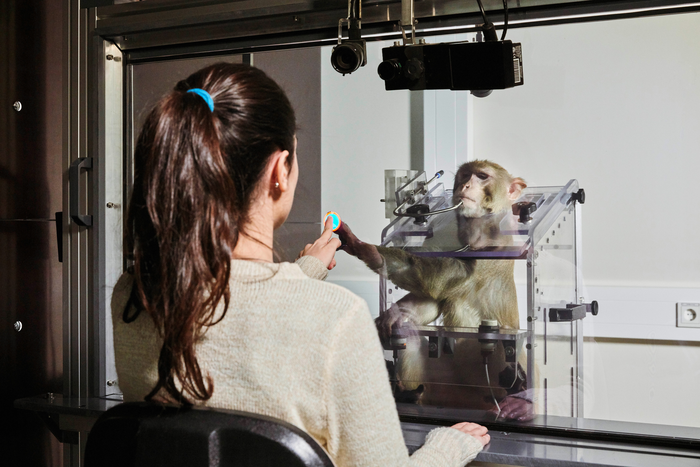Drama or comedy? Couples who want to spend Sunday evenings together in front of the TV but like different movie genres face this question again every weekend. Do they agree on a movie and watch it together? Or does each one watch “their” favorite movie alone? And when they watch TV together, do they take turns picking?

Credit: Deutsches Primatenzentrum
Drama or comedy? Couples who want to spend Sunday evenings together in front of the TV but like different movie genres face this question again every weekend. Do they agree on a movie and watch it together? Or does each one watch “their” favorite movie alone? And when they watch TV together, do they take turns picking?
Researchers at the German Primate Center – Leibniz Institute for Primate Research in Göttingen have studied how monkeys and humans coordinate and resolve such inherent conflicts of interest. In humans, this problem is already well studied in the context of game theory. But in contrast to previous approaches, the coordination game has now been extended to include a visibility component: In the game setting developed by Sebastian Möller, Igor Kagan and colleagues from the Cognitive Neuroscience Laboratory and the Cognitive Ethology Laboratory, players were able to observe their counterparts while making decisions. The research showed that both humans and rhesus monkeys follow the actions of their counterpart and include them in their decision. However, they use different strategies in doing so. Humans coordinate in a dynamic process and achieve a “fair” balance over time: “today” you get to choose, next week it’s my turn. In contrast, rhesus monkeys coordinate statically, which often means that one of the two players loses out over time. Two rhesus monkeys learned dynamic coordination skills after playing with human partner, but unlike humans, used these skills to compete (eLife).
Most primate species live in complex social groups. To keep the group together, avoid conflict, and achieve individual as well as common goals, group members must coordinate their various interests. Game theory offers proven approaches to analyze rational decision-making behavior in social conflict situations, where an individual’s success depends not only on his or her own actions, but also on the actions of others.
“In many social situations, interactions mostly do not take place sequentially or without knowing what the others are doing, as in the framework of classical game theories, but openly, for example face-to-face. Therefore, we developed a transparent game environment (the Dyadic Interaction Platform) in which we could investigate whether and how monkeys and humans solve game-theoretical problems such as the “Bach or Stravinsky”, while they sit in front of each other and see actual eye, head and hand movements. We wanted to know whether they behave differently when they can consider the other person’s action into their own decision in real time,” says Sebastian Möller, a neuroscientist at the German Primate Center and first author of the study.
Much like the Sunday film selection example above, the “Bach or Stravinsky” game encourages coordination but also entails a conflict over which of the two coordinated options to choose. It turned out that the majority of the pairs tested, whether human or monkey, learned to coordinate their behavior in order to increase their reward. Half of the human pairs achieved near-optimal coordination by dynamically taking turns to maintain a fair balance of rewards across all moves. The
rhesus monkeys, on the other hand, used simpler strategies. They did not coordinate their moves dynamically by creating a balance over time, but coordinated their actions statically, for example they converged on always the same of the two options, or on the same side of the display. Two monkeys trained to play the game with a human confederate showed the ability to coordinate their decision dynamically rather than statically, that is, to observe the human partner and to switch between options. Remarkably, after this training macaques began to coordinate dynamically with each other, but in a competitive manner: a monkey who was faster to make a choice obtained a larger share of the reward.
The study showed that both monkeys and humans use information about what the opponent is doing to coordinate their actions, though remarkably by different means and to different ends. “The fact that rhesus monkeys did not dynamically take cooperative turns may be because they are cognitively limited in longer-term planning and taking the perspective of the opponent. Their static strategies require fewer cognitive resources and are easier to coordinate. But it is also likely that due to macaques’ competitive nature, less normative social influence, and higher subjective value of the rewards, they are driven by more selfish motives” says Igor Kagan, leader of the study and explains: “Dynamic face-to-face encounters are an integral part of primate social evolution. Understanding how the two species use the visibility of actions to achieve and maintain coordination sheds light on the evolution of cooperation and competition and sets the stage for studying the neural basis of dynamic interactions.”
Journal
eLife
DOI
10.7554/eLife.81641
Method of Research
Experimental study
Subject of Research
Animals
Article Title
Human and macaque pairs employ different coordination strategies in a transparent decision game
Article Publication Date
17-Feb-2023




